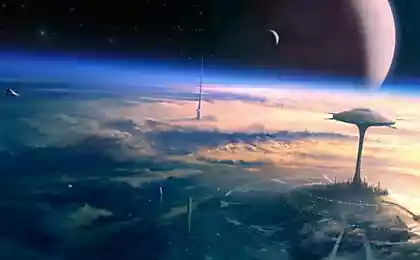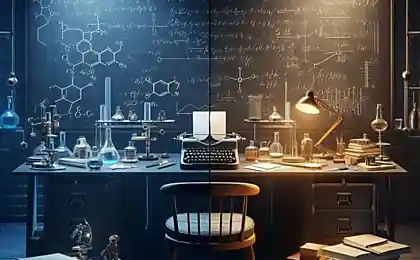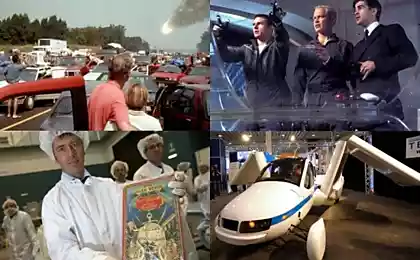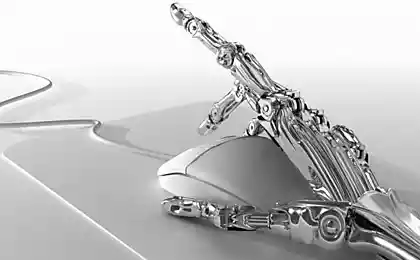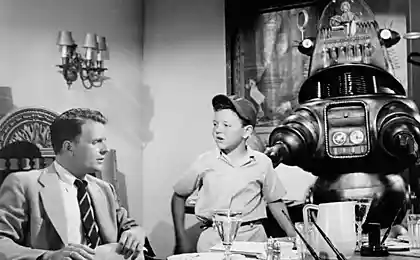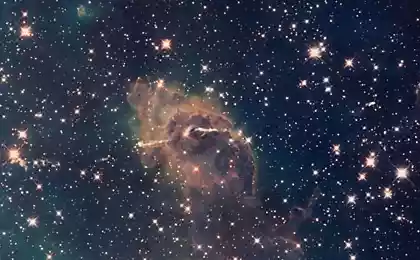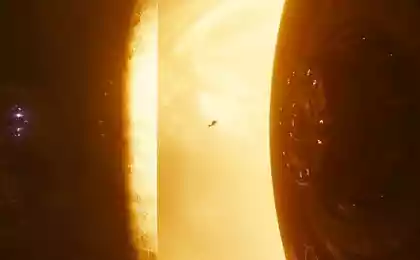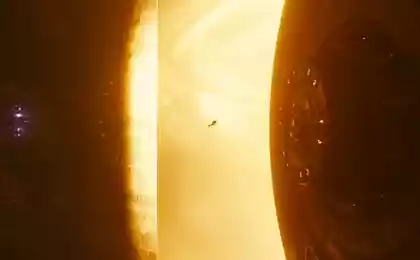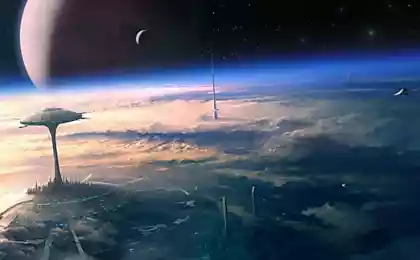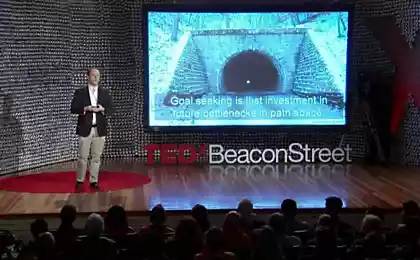1047
What I learned about the future after reading 100 sci-fi books. Part 2

This is the second part of my sci-fi experiment , in which I try to imagine the future, exploring the 100 best ideas of science fiction novels. *
4. The more technology develops, the less noticeable it becomes
Almost all the visions of the future, met me, has one thing in common: they are dominated by visible technology. It's kind of the first bell, telling us that the writer is mistaken.
Almost each of these stories technologies are something intrusive, tangible, monolithic and fixated on himself. Cities are usually presented as whole sea of buildings covered with chrome, where not a single tree. The apartments utensils cumbersome props walls, decorated with plastic, just like the space capsule of the sixties. Our bodies are crammed rough mechanisms means that transhumanism externally bring man to machine, and not vice versa.
But personally for me it is absolutely obvious that the technology will develop quite differently. These predictions are suited to a civilization that has just opened gadgets, which is mired in neomanii, all new obsession, which is presented as the future of the world, where all will be more and where everything will be great. Like a child who thinks that adults - people tall, able to buy more expensive toys (although I know some individuals really think so).
Most likely, the technology of the future in the end will turn into something like the forces of "Star Wars." Think about it. She has the best interface of all: it do not exist. No delay between thought and action, there is no barrier between subject and object. Jedi Knight never worried about whether it has been updated to a new version, it is necessary to charge the battery if he or remember the password from the Wi-Fi.
The Power is everywhere and nowhere; it can be used for evil, but it is fully revealed only on the bright side; its essence is spiritual power, but it has a direct practical application. The day when I will be able to raise his hand and with the help of the thought, to translate their intentions into practice, will be a day when technology really rise to a new level. Not before.
What, in my opinion, there will be: technology disappear. Will go into the background will merge with the walls, furniture and clothing, will be smaller, but their functionality expands. They will attract less attention, as their main objective will be to preserve our self-awareness, because, as we know now, we can only automate the application of creativity. So let your mind instead of images of "Blade Runner" appears Ancient Greece - will dominate ideas, not the tools.
In the future, the technology in their current form are not important, because the main factor is autonomous - they must disappear the need for constant maintenance and fine-tuning, because it will allow us to decide what we really want to use them. Technology will cease to be the ultimate goal and become a means to achieve something much more important.
5. The collective consciousness - is our greatest hope, and the most terrible fear
When people think of science fiction, in their mind there are images of space opera - huge spaceships, flying through hyperspace, lasers, other planets. Star Trek, in short.
But no matter how exciting and fantastic space opera may be, I am always most interested in stories that explores our "inner space." In science fiction we have a unique ability to create thought experiments, exploring our inner state. The human brain is not strong in abstractions - thinking it is easier to cope with the stories revolving around the story, which has a basis in the real world (hence the word "science»).
Let me give an example.
I noticed something very interesting: in many books absolute destiny of mankind is some form of collective consciousness. Whether planetary superorganism of "edge of the base," or connection through nano-formulation of "Nexus", the idea of uniting our minds and experience has always been something lofty and utopian. I was shocked when I learned that there is a serious study of the possibility of "panpsychism" - ideas, which states that everything in the universe has a mind, or has the potential for its occurrence.
But at the same time, it terrifies us. It's amazing how often the enemy of mankind becomes zhukopodobny, collective Overmind. Apparently, a swarm or hive seems the antithesis of the whole human race. The planetary superorganism of "Solaris" terrifying not because of the fact that he has some evil intent, but because he does not have a central consciousness that we could understand. In "Ender's Game" beetles beetles workers and soldiers remotely controlled queen (how often it appears in the films plot element - the need to destroy the queen or super-intelligence to disable all the others?). And, of course, we all remember the Borg Collective, which is especially frightening, because it consists of the creatures once possessed individually, but they are now deprived.
For me, this contradiction illustrates one of the central problems of mankind better than a million books on popular psychology. We create communications in a flash, but the vulnerability is considered almost threatened existence. Study after study, we are told that to be happy one needs public relations - regardless of time, culture, age or personality of the individual. So why is it so difficult to achieve happiness? Because relationships include short-term risk and only hope for some acquisition in the long term. Like the characters of space operas, we are forced to leave their comfort zone, even if the "spaceship" is only the table.
The collective consciousness is both our greatest hopes and worst fears. Perhaps the main obstacle to the creation of a "humanoid" intelligence will not, as far as we're smart, but the extent to which we are inconsistent.
6. Confusion and chaos, not the size of transistors, will be the main obstacle in our way
That's how we see the future - that technology is everything, that soon they will solve all our problems and will include all spheres of human life - this view was the only correct opinion. Everything else met with hostility.
I would not say that I am completely immune to it. Book Raymond Kurzweil "The Singularity is near" has become for me almost transcendental experience, the modern equivalent of the pictures of the future, seen through crystal ball. After the arguments are so strong, so self-evident at first glance, scientific (there is graphics!). Apparently, increasing the danger of being left behind, while advancing its time was merit. As a result, we are trying to outdo each other predictions about future scientific breakthroughs (cars will ride on the roads yourself in ten years! No, five!), As if faith alone in the singularity will enable it to become a part of.
At the same time (and this I am very concerned), the only alternative to a blind belief in the inevitable singularity is fundamental mysticism - consciousness is an unsolved mystery, the human mind is a black box, not obeying the laws of physics. So we perceive the universe, Copernicus is not erased this nonsense into a powder.
But what about this says science fiction? Can it help us to imagine possible alternatives of slow and glorious approach to utopia, while not referring to mysticism?
Here is just one example of this scenario:
There is the possibility that human consciousness is impossible to simulate, but not because of the fact that it is incomprehensible, and because it is too complicated. Our understanding (not to mention the management) complex systems can not be called complete (remember the Malaysia Airlines flight 370, the financial crisis of 2008-2009 and the "Snegopokalipsis" 2015).
This is the basis of chaos theory: complex systems are not linear; causes and effects inside them can not be represented as vectors and simply pass on any scale phenomenon. There are certain fixation point - the place where action and reaction reach their critical values, such as a situation where you hit the ball on the miniature golf course just a bit stronger than their partner, causing the ball hard to overcome the hill and sent a new maze of obstacles and tunnels .
I remember in the book about the theory of chaos, I saw one intriguing idea, stating that there are intricate system so that they can not simulate. For example, problems that can only be solved by algorithms operating in superpolynomial time, and so if a (very) short, meaning that the time needed for their implementation increases exponentially depending on the number of incoming requests, which makes them quite impractical .
Imagine that the human mind will suddenly a problem - we are aware that it is a system that can not be modeled, which means that advances in computation or recursive self-improvement for it does not mean anything. Even if we manage to create computers in all respects equivalent to our brains, they will always have to work in such a scenario. They will be limited not only the "number of angels dancing on the head of a pin," but by the logic of the principles on which they work.
What irony!
* The primary translation of the second part is made Artem Ignatyev , permission to publish on Geektimes received from the author of the original text Tiago Forte , translation of the first part and the second edition of Kpyto sub> i>
Source: geektimes.ru/post/253358/
Video broadcast with quadrocopters for $ 75? Watch Syma X5SW
Tomorrow, New Horizons will approach Pluto in the minimum distance

